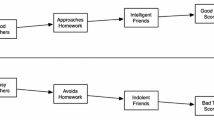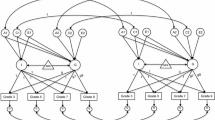Abstract
Previous twin studies have provided evidence for genetic influences on reading disability (RD) or “normal” reading ability. The existence of subtypes of RD — each with its characteristic cognitive profile — has been suggested. Whether the etiology of the particular subtypes is genetic is uncertain. The present study examined within-pair comparisons of cognitive profiles (with respect to composites of general reading, symbol processing speed and sequential memory) in RD and control twins. Twin profile analysis were applied to these cognitive composites on 120 pairs of RD and control twins. Results showed a greater monozygotic (MZ) than dizygotic (DZ) resemblance in profiles indicating that individual differences in the patterning of cognitive abilities related to reading are genetically influenced.
Similar content being viewed by others
References
Baker, H. J. and Leland, B. 1959. Detroit Tests of Learning Aptitude. Indianapolis: Test Division of Bobbs-Merrill.
Bakwin, H. 1973. Reading disability in twins. Developmental Medicine and Child neurology, 15, 184–187.
Boder, E. 1971. Developmental dyslexia: A diagnostic screening procedure based on three characteristic patterns of reading and spelling. In B. Bateman (ed.) Learning Disorders. Vol. 4. Seattle, WA: Special Child Publications.
Decker, S. N. and DeFries, J. C. 1981. Cognitive Ability Profiles in Families of Reading-disabled Children. Developmental Medicine & Child Neurology, 23, 217–227.
Decker, S. N. and Vandenberg, S. G. 1985. Colorado twin study of reading disability. In D. Gray and J. Kavanaugh (eds), Biohavioral Measures of Dyslexia. Baltimore: York Press.
DeFries, J. C., Fulker, D. W. and LaBuda, M. C. 1987. Evidence for a genetic aetiology in reading disability of twins. Nature. 329, 537–539.
DeFries, J. C., Singer, S. M., Foch, T. T. and Lewitter, F. I. 1978. Familial nature of reading disability. British Journal of Psychiatry, 132, 361–367.
Dunn, L. M. and Markwardt, F. C. 1970. Examiner's Manual: Peabody Individual Achievement Test. Circle pines, MN: American Guidance Service.
Foch, T. T., DeFries, J. C., McClearn, G. E. and Singer, S. M. 1977. Familial Patterns of impairment in reading disability. Journal of Educational Psychology, 69, 316–329.
Harris, E. L. 1986. The contribution of twin research to the study of the etiology of reading diability. In S. D. Smith (ed.), Genetics and Learning Disabilities. San Diego, California: College Hill Press, Inc.
Ho, H-Z. and Decker, S. N. 1988. Cognitive resemblance in reading-disabled twins. Developmental Medicine and Child Neurology, 30, 99–107.
Ho, H-Z., Gilger, J. W. and Decker, S. N. 1988. A twin study of Bannatyne's “genetic dyslexic” subtype. Journal of Child Psychology and Psychiatry, 29, 63–72.
Husen, T. 1960. Abilities of twins. Scandinavian Journal of Psychology, 1, 125–135.
Matheny, A. P. and Dolan, A. B. 1974. A twin study of genetic influences on reading achievement. Journal of Learning Disabilities, 7, 99–102.
Nichols, R. C. and Bilbro, W. C. 1966. The diagnosis of twin zygosity. Acta Geneticae Medicae et Gemellologiae, 16, 265–275.
Pennington, B. F., Smith, S. D., McCabe, L. L., Kimberling, W. J. and Lubs, H. A. 1984. Developmental continuities and discontinuities in a form of familial dyslexia. In R. N. Emde and R. J. Harmon (eds), Continuities and Discontinuities in Development. New York: Plenum Press.
Pennington, B. F. 1986. Issues in the diagnosis and phenotype analysis of dyslexia: Implications for family studies. In S. D. Smith (ed.), Genetics and Learning Disabilities. San Diego, California: College Hill Press, Inc.
Satz, P. and Morris, R. 1981. Learning disability subtypes: A review. In F. J. Pirozzolo and M. C. Wittrock (eds), Neurological and Cognitive Processes in Reading (pp. 109–141). New York: Academic Press.
Segal, N. L. 1985. Monozygotic and Dizygotic twins: A comparative analysis of mental ability profiles. Child Development, 56, 1051–1058.
Vandenberg, S. G. 1962. The hereditary abilities study: hereditary components in a psychological test battery. American Journal of Human Genetics, 14, 200–237.
Vellutino, F. R. 1978. Toward an understanding of dyslexia: Psychological factors in specific reading disability. In A. I. Benton and D. Pearl (eds) Dyslexia: An Appraisal of Current Knowledge. New York: Oxford University Press.
Wechsler, D. I. 1974. Wechsler Intelligence Scale for Children-Revised. New York: Psychology Corporation.
Wechsler, D. I. 1981. Examiner's Manual: Wechsler Adult Intelligence Scale — Revised. New York: Psychological Corporation.
Wilson, R. S. 1975. Twins: Patterns of cognitive development as measured on the WPPSI. Developmental Psychology, 11, 126–134.
Wilson, R. S. 1979. Analysis of longitudinal twin data. Acta Geniticae Medicae et Gemellologiae, 28, 93–105.
Zerbin-Rudin, E. 1967. Congenital word-blindness. In P. E. Becker (ed.) Humangenetik. Stuttgart, Germany: Thieme. (Bulletin of the Orton Society, 17, 47–54).
Author information
Authors and Affiliations
Rights and permissions
About this article
Cite this article
Ho, HZ., Decker, S.N. A comparative analysis of cognitive profiles: Monozygotic and dizygotic reading-disabled twins. Read Writ 1, 61–72 (1989). https://doi.org/10.1007/BF00178838
Issue Date:
DOI: https://doi.org/10.1007/BF00178838




